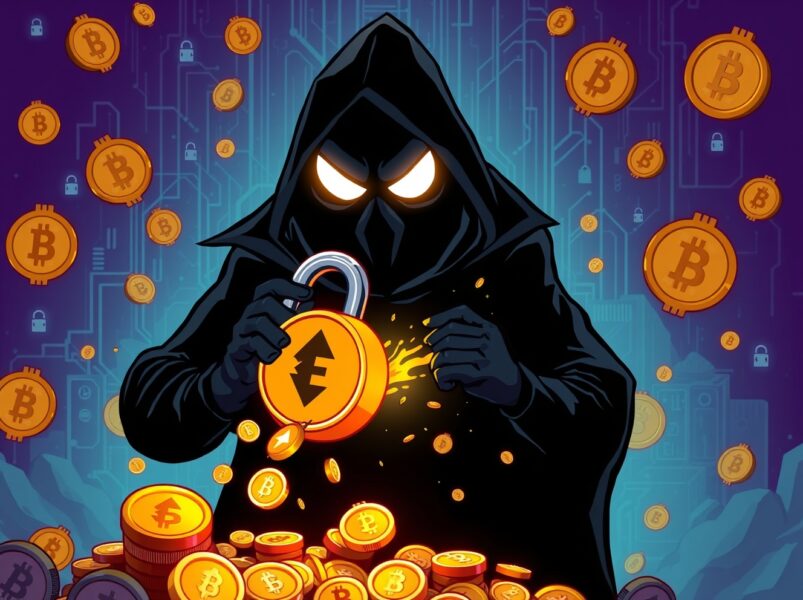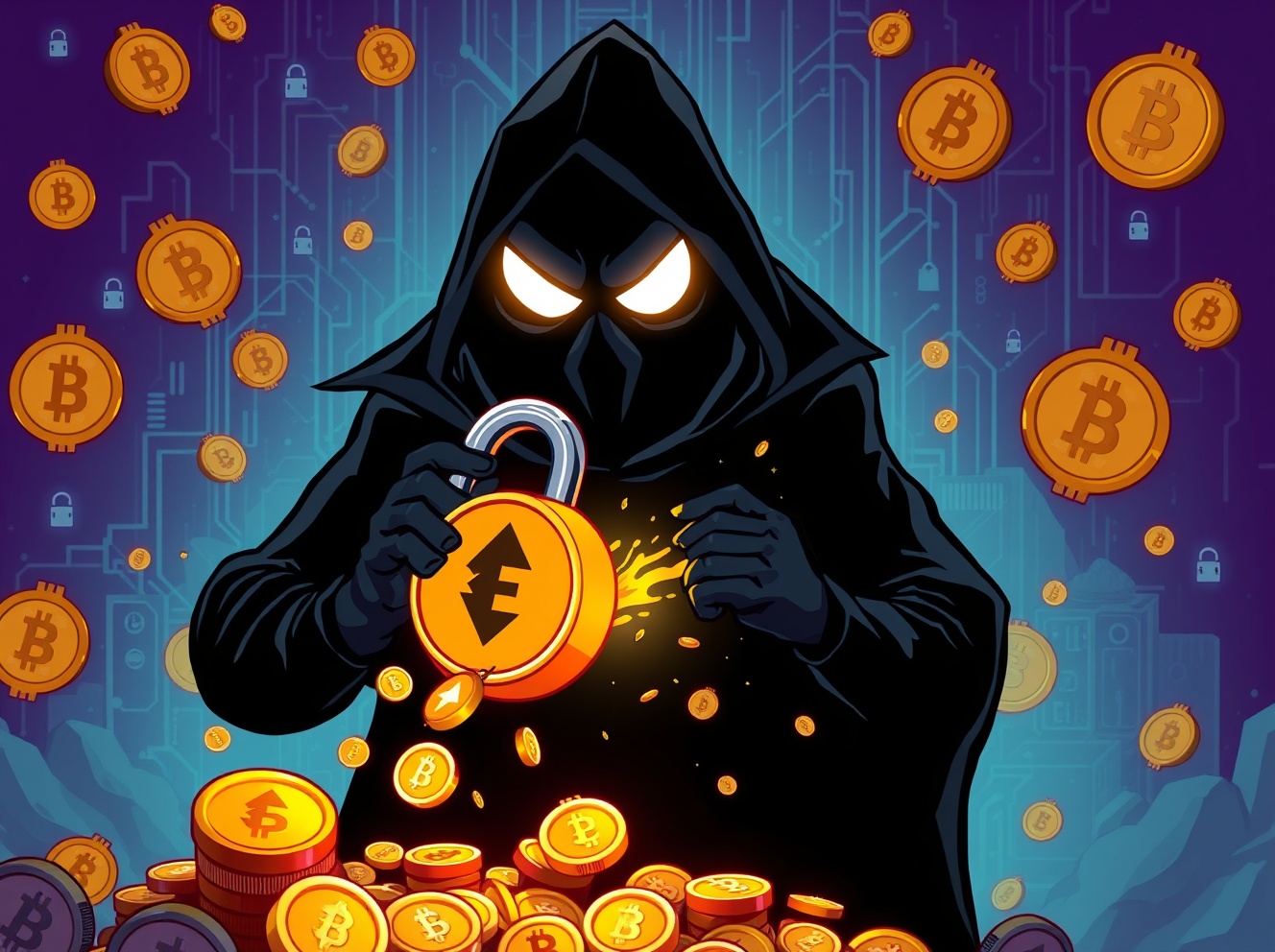Alarming: UXLink Hacker Sells 2.5 Billion Tokens in Massive ETH Swap
0
0

BitcoinWorld

Alarming: UXLink Hacker Sells 2.5 Billion Tokens in Massive ETH Swap
The cryptocurrency world is once again buzzing with concerns over security and market stability following a significant event involving UXLink. Recently, a UXLink hacker executed a massive token swap, converting billions of UXLINK tokens into Ethereum. This incident has sent ripples through the market, highlighting the ever-present risks in the decentralized finance (DeFi) space.
What Did the UXLink Hacker Do?
On-chain analytics firm Lookonchain brought to light a substantial transaction that has captured the attention of the crypto community. Six addresses, strongly suspected of belonging to the UXLink hacker, were observed swapping approximately 2.49 billion UXLINK tokens.
These tokens were converted into 6,732 ETH, valued at an estimated $28.1 million, across various decentralized exchanges (DEXs). This move suggests a deliberate and coordinated effort to liquidate a significant holding of UXLINK.
Lookonchain also noted that the hacker sold additional substantial volumes of UXLINK tokens on other exchanges. This multi-platform approach likely aimed to minimize market impact on any single exchange, although the sheer volume still had a profound effect.
Understanding the Immediate Market Impact of the UXLink Hacker‘s Actions
The immediate aftermath of the UXLink hacker‘s actions was stark. According to data from CoinMarketCap, the UXLINK token experienced a dramatic price reduction. It was reported to be trading at $0.1109, representing a staggering decrease of 80.09%.
Such a steep drop underscores the volatility inherent in the crypto market, especially when large volumes of tokens are unexpectedly sold off. This event undoubtedly created significant concern and losses for many UXLINK holders.
The sudden influx of tokens onto the market, coupled with the nature of a suspected hack, often triggers panic selling. This reaction can exacerbate price declines, leading to a cascade effect across trading platforms.
The Broader Implications: How the UXLink Hacker Incident Affects Trust
Beyond the immediate financial losses, incidents like the UXLink hacker‘s token swap carry broader implications for the entire cryptocurrency ecosystem. They erode investor trust, particularly in newer or less established projects. When security vulnerabilities are exploited, it raises questions about the robustness of a project’s infrastructure and its ability to protect user assets.
Decentralized exchanges, while offering freedom and anonymity, also present unique challenges. Their open nature can sometimes make them attractive targets for malicious actors seeking to quickly liquidate stolen assets without extensive KYC (Know Your Customer) procedures.
This event serves as a crucial reminder that while DeFi promises innovation, it also demands constant vigilance and robust security measures from both project developers and individual users. The collective confidence in the market relies heavily on the perceived safety of digital assets.
Navigating Crypto Security in the Wake of the UXLink Hacker
For individuals involved in cryptocurrency, incidents like the UXLink hacker‘s activities highlight the critical importance of security. While no system is entirely immune to threats, several practices can help mitigate risks:
- Diversify Your Portfolio: Avoid putting all your funds into a single asset, especially those with smaller market caps or newer projects.
- Stay Informed: Regularly monitor news and updates from projects you invest in. Be aware of any security advisories or suspicious activities.
- Use Strong Security Practices: Enable two-factor authentication (2FA) on all your exchange accounts. Consider hardware wallets for storing significant amounts of cryptocurrency offline.
- Be Skeptical of Unsolicited Offers: Phishing scams and fraudulent links are common. Always double-check URLs and sender identities before clicking.
- Understand the Risks: Acknowledge that the crypto market is inherently volatile and carries risks, including potential hacks and exploits.
These steps are not foolproof but can significantly enhance your personal security posture in the dynamic world of digital assets.
Conclusion
The incident involving the UXLink hacker and the subsequent sale of 2.5 billion tokens for $28.1 million in ETH is a sobering reminder of the challenges within the crypto space. It underscores the ongoing battle between innovation and security, and the need for continuous improvement in safeguarding digital assets. While the market has shown resilience over time, each such event serves as a crucial lesson, urging both projects and investors to prioritize robust security measures and informed decision-making.
Frequently Asked Questions (FAQs)
Q1: What exactly happened with the UXLink tokens?
A: A suspected UXLink hacker sold approximately 2.49 billion UXLINK tokens, converting them into 6,732 ETH (worth $28.1 million) across multiple decentralized exchanges (DEXs), as reported by Lookonchain.
Q2: How did this affect the UXLINK token price?
A: The UXLINK token experienced a sharp decline, dropping by 80.09% and trading at $0.1109 following the hacker’s sell-off, according to CoinMarketCap data.
Q3: What are decentralized exchanges (DEXs) and why were they used?
A: DEXs are cryptocurrency exchanges that operate without a central authority, allowing users to trade directly peer-to-peer. They were likely used by the UXLink hacker for their speed, liquidity, and often less stringent identity verification processes, which can facilitate quick liquidation of assets.
Q4: How can investors protect themselves from similar incidents?
A: Investors can protect themselves by diversifying portfolios, staying informed about project security, using strong passwords and two-factor authentication, considering hardware wallets for cold storage, and being wary of phishing attempts and suspicious links.
Q5: Does this incident mean all cryptocurrencies are unsafe?
A: No, this incident highlights specific vulnerabilities that can exist within projects or platforms. While no investment is without risk, established cryptocurrencies and platforms often have more robust security measures. It emphasizes the importance of due diligence and understanding the risks associated with individual projects.
If you found this article insightful, please consider sharing it with your network! Your support helps us continue to provide timely and relevant cryptocurrency news and analysis.
To learn more about the latest crypto market trends, explore our article on key developments shaping Ethereum price action.
This post Alarming: UXLink Hacker Sells 2.5 Billion Tokens in Massive ETH Swap first appeared on BitcoinWorld.
0
0
 Manage all your crypto, NFT and DeFi from one place
Manage all your crypto, NFT and DeFi from one placeSecurely connect the portfolio you’re using to start.






